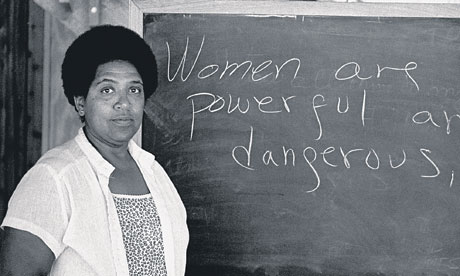There's also a video, and I'm inspired to write about an aphorism you can see at 1:57: a shot of a room in a clinic — presumably a room where abortions are performed. The label on the door reads "Audre," and on the wall, in large capital letters, there's a quote and the name "Audre Lorde." The quote reads "Our feelings are our most genuine paths to knowledge."
Audre Lorde was a Caribbean-American writer (1934-1992) who is a source of some popular feminist aphorisms, notably "The master's tools will never dismantle the master's house." The one painted on the wall shown in the video suggests an argument about abortion that resonates with abortion rights doctrine, that the woman finds her own meaning. The Supreme Court's cases depict the woman engaging in a philosophical/theological/scientific inquiry into the significance of the entity she may choose either to nurture within or to extricate. The Lorde quote seems like a feminist paraphrase, where the mental process runs along a path of feelings.
The woman entering the room is invited into an awareness of her feelings. Feelings are the most genuine way to your decision. Perhaps the woman entering the room thinks: I don't feel this is anything like a baby or that I am murdering anyone. Or: I hear my future child begging for life. The quote — to my eye — calls you to experience your conscience, and it doesn't let you off the hook. The painted letters seem to be the only decoration in the room. It's the place to focus your eyes throughout the procedure.
I wonder what women's names appear on the other doors. Do the names take the place of room numbers and are the rooms referred to by name in an effort to give warmth to the place? You're a name not a number.
I wonder what are the other aphorisms in the other rooms. Are they all so neutral and open-ended as to the woman's right to choose?

No comments:
Post a Comment